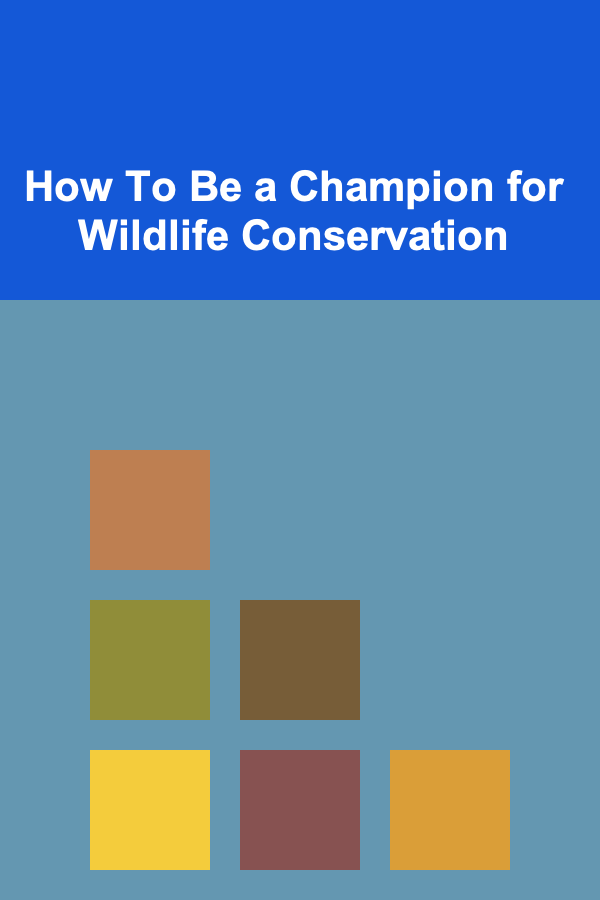
How To Be a Champion for Wildlife Conservation
ebook include PDF & Audio bundle (Micro Guide)
$12.99$8.99
Limited Time Offer! Order within the next:

Wildlife conservation is a vital cause that encompasses the protection and preservation of wildlife, their habitats, and the ecosystems they rely on. As the human impact on the planet grows, the need to protect wildlife becomes more urgent. From the loss of biodiversity to the degradation of ecosystems, the challenges facing wildlife are vast and complex. However, every individual has the power to make a difference. This article explores how you can become a champion for wildlife conservation, offering insights into actions you can take, the importance of wildlife preservation, and the broader impact of your efforts.
Understanding the Importance of Wildlife Conservation
Before embarking on the path of becoming a wildlife conservation champion, it's crucial to understand why this cause is so significant. Wildlife conservation is not just about protecting animals; it's about ensuring the health of the entire planet. Biodiversity, which includes the variety of species, ecosystems, and genetic diversity, is essential for the stability and functioning of the Earth's systems. The destruction of wildlife populations and their habitats has far-reaching consequences, affecting everything from climate change to food security.
The Role of Wildlife in Ecosystems
Every species plays a specific role within its ecosystem. For example, pollinators like bees, butterflies, and bats contribute to the reproduction of plants, including many that humans depend on for food. Predators help regulate the populations of herbivores, preventing overgrazing, while scavengers contribute to breaking down organic matter and recycling nutrients back into the soil. These intricate interactions create a balance that sustains ecosystems and human life.
When species go extinct or their populations dwindle, this balance is disrupted, often leading to cascading effects. The loss of biodiversity can weaken ecosystems, reduce resilience to climate change, and harm the economy and human health.
The Crisis Facing Wildlife Today
The current state of wildlife conservation is grim. Many species are threatened with extinction, and countless ecosystems are being destroyed at an alarming rate. Habitat destruction, climate change, poaching, pollution, and invasive species are just a few of the factors contributing to the ongoing crisis.
- Habitat Destruction: Deforestation, urbanization, and industrial agriculture are rapidly encroaching on natural habitats. These activities fragment and destroy ecosystems, making it harder for species to survive.
- Climate Change: Global warming is causing shifts in temperature and weather patterns, which can make certain habitats uninhabitable for species that are not able to adapt quickly enough.
- Poaching and Illegal Trade: The demand for wildlife products, such as ivory, fur, and exotic pets, fuels poaching. This illegal trade devastates populations of endangered species.
- Pollution: Pollution, whether in the form of plastic waste, pesticides, or chemical runoff, harms wildlife by contaminating water sources, food, and air.
- Invasive Species: Non-native species can disrupt the natural balance of ecosystems, outcompeting local wildlife for resources or introducing diseases that native species have no resistance to.
These threats have led to a significant decline in wildlife populations worldwide. According to the World Wildlife Fund (WWF), the global population of vertebrate species has decreased by nearly 70% since 1970. This decline in biodiversity is one of the most pressing environmental issues of our time.
How to Become a Champion for Wildlife Conservation
Now that you understand the importance of wildlife conservation and the challenges facing wildlife today, it's time to explore how you can make a difference. Becoming a champion for wildlife conservation involves a combination of personal actions, advocacy, and support for organizations that are working to protect wildlife.
1. Educate Yourself and Others
The first step in becoming a champion for wildlife conservation is to educate yourself. Understanding the issues, the species at risk, and the challenges involved is essential to being an effective advocate. Start by learning about the specific wildlife species and habitats in your region or those that are of global significance. Read books, watch documentaries, and follow organizations like the World Wildlife Fund, The Nature Conservancy, and Greenpeace to stay informed about the latest developments in conservation.
Once you have gained knowledge, share it with others. Raising awareness is one of the most powerful tools you have to create change. Talk to your friends and family about the importance of wildlife conservation, the threats animals face, and the steps people can take to help. Social media is another great platform for spreading the word, sharing articles, documentaries, and conservation tips.
2. Support Conservation Organizations
Many non-profit organizations are dedicated to wildlife conservation, and they rely on donations and volunteers to carry out their work. Supporting these organizations, whether financially or through your time and expertise, is one of the most effective ways to contribute to conservation efforts. Some of the world's leading conservation organizations include:
- World Wildlife Fund (WWF): One of the largest and most recognized conservation organizations, WWF works on a wide range of environmental issues, from wildlife protection to sustainable development.
- Wildlife Conservation Society (WCS): WCS is known for its work in protecting wildlife and wild places across the globe, including conducting scientific research and advocating for policy changes.
- The Nature Conservancy: Focused on preserving land and water resources, The Nature Conservancy works to protect critical habitats for wildlife.
These organizations often offer different ways to support their work, such as making a one-time or monthly donation, participating in fundraising campaigns, or volunteering.
3. Adopt Sustainable Practices
One of the most impactful things you can do as an individual is to reduce your ecological footprint. By adopting sustainable practices in your everyday life, you can help mitigate some of the threats facing wildlife and their habitats. Here are some ways to get started:
- Reduce, Reuse, and Recycle: Minimizing waste is crucial for reducing pollution. By recycling and reusing products, you help reduce the amount of plastic and other harmful materials that can end up in oceans and wildlife habitats.
- Buy Sustainable Products: When purchasing goods, choose products that are sustainably sourced. This could include items made from recycled materials, certified organic food, or clothing made from environmentally friendly fabrics.
- Reduce Your Carbon Footprint: Reducing energy consumption, driving less, and using renewable energy sources can help slow down climate change, which is one of the major threats to wildlife.
- Support Eco-Friendly Brands: Many companies are working to reduce their environmental impact. By supporting these businesses, you contribute to a more sustainable future.
4. Volunteer Your Time
Volunteering is a powerful way to get involved in wildlife conservation. Whether it's helping with wildlife rehabilitation, participating in beach cleanups, or working with local conservation groups, there are many ways to volunteer your time and skills to support wildlife.
Some organizations also offer opportunities for fieldwork, where you can participate in research, habitat restoration, or even working directly with wildlife. Volunteering not only helps wildlife but also gives you the chance to learn from experts in the field and gain hands-on experience.
5. Advocate for Stronger Wildlife Protection Laws
Advocacy is a vital part of wildlife conservation. Governments play a significant role in shaping policies that affect wildlife protection, habitat preservation, and environmental regulations. You can be an advocate by supporting laws and policies that promote wildlife conservation and pushing for stronger protections.
- Support Conservation Legislation: Research laws and policies related to wildlife conservation in your country and support those that protect endangered species, reduce poaching, and preserve natural habitats.
- Contact Elected Officials: Write letters, sign petitions, or attend town halls to voice your support for stronger wildlife protection measures. Politicians are more likely to act when they see that their constituents care about conservation.
- Participate in Public Awareness Campaigns: Many organizations and activists run campaigns to raise awareness about specific species or conservation issues. By participating in these campaigns, you help increase public pressure on governments and corporations to take action.
6. Participate in Citizen Science Projects
Citizen science allows ordinary people to contribute to scientific research and data collection. Many conservation organizations and research projects rely on volunteers to gather important data about wildlife populations, habitat conditions, and ecosystem health. Participating in citizen science projects is a great way to contribute directly to conservation efforts while learning more about the species and ecosystems you're helping to protect.
Some examples of citizen science projects include:
- Bird Watching: Participate in bird monitoring programs like the Audubon Society's Christmas Bird Count or the Cornell Lab of Ornithology's eBird platform to track bird populations.
- Wildlife Monitoring: Organizations like the WWF and the Center for Biological Diversity have citizen science programs that focus on monitoring endangered species and wildlife habitats.
- Marine Conservation: Many marine conservation projects encourage volunteers to report sightings of marine life, help with beach cleanups, or monitor coral reefs.
7. Lead by Example
Ultimately, one of the most effective ways to be a champion for wildlife conservation is by leading by example. Your actions speak louder than words, and when others see you making a conscious effort to protect the environment and wildlife, they may be inspired to do the same.
Whether it's through sustainable lifestyle choices, supporting conservation initiatives, or simply being a voice for wildlife, your influence can create a ripple effect that inspires others to take action.
Conclusion
Becoming a champion for wildlife conservation is an ongoing journey that requires commitment, action, and advocacy. By educating yourself, supporting conservation organizations, adopting sustainable practices, and advocating for stronger protections, you can play an integral role in protecting wildlife and preserving the planet for future generations.
The challenges facing wildlife are immense, but the collective actions of individuals can make a significant difference. Every step you take, no matter how small, contributes to a global movement dedicated to preserving the natural world and the incredible species that inhabit it. The time to act is now---become a champion for wildlife conservation and help ensure that our planet remains a thriving home for all living creatures.

A Comprehensive Guide to Lowering Business Insurance Premiums in Any Industry
Read More
How to Create a Financial Plan for Starting Your Own Business
Read More
How to Make Money Online as an Online DJ: 10 Actionable Ideas
Read More
How to Soundproof a Condo Without Major Renovations
Read More
How to Recover from Workouts with Proper Nutrition
Read More
How to Track Life Insurance Expenses with Mobile Apps
Read MoreOther Products

A Comprehensive Guide to Lowering Business Insurance Premiums in Any Industry
Read More
How to Create a Financial Plan for Starting Your Own Business
Read More
How to Make Money Online as an Online DJ: 10 Actionable Ideas
Read More
How to Soundproof a Condo Without Major Renovations
Read More
How to Recover from Workouts with Proper Nutrition
Read More